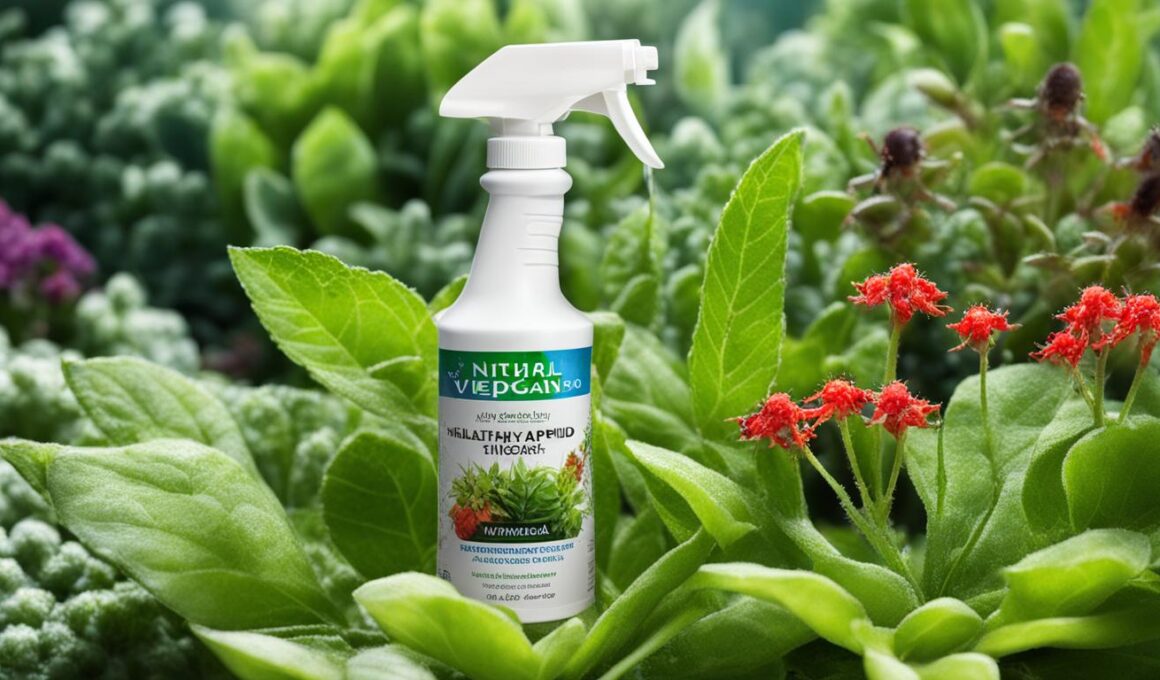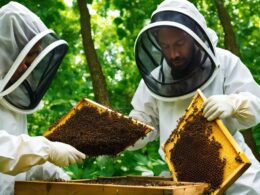Welcome to our article on natural aphid spray vinegar, an eco-friendly solution for organic gardening. If you’re looking for effective ways to get rid of aphids without resorting to harmful chemicals, vinegar can be a great option. In this guide, we’ll explore the benefits of using vinegar as a natural pesticide spray and how it can help you maintain a thriving garden.
Aphids can be destructive and overwhelming garden pests. Their colonies can quickly multiply, causing stress to your plants and hindering their growth. But with a natural aphid spray vinegar, you can combat these pests in a safe and environmentally friendly way.
Using vinegar as a natural pesticide spray harnesses its acid concentration, making it an effective aphid repellent. It’s essential to choose the right vinegar for your spray, such as apple cider vinegar, which has a lower acid concentration and poses minimal threat to your plants when mixed with water and soap.
In the next sections, we’ll provide you with detailed information on how to make DIY natural aphid spray using vinegar, soap, and water. We’ll also discuss the impact of aphids on gardens and the importance of prevention. So, let’s dive in and discover how you can maintain an aphid-free garden the eco-friendly way!
Understanding Aphids and Their Impact on Gardens
Aphids, also known as plant lice or greenflies, are destructive and overwhelming garden pests that can cause significant damage to both indoor and outdoor plants. These tiny sap-sucking insects have the ability to quickly invade gardens, forming colonies that can reproduce at an alarming rate.
Female aphids, in particular, have a remarkable reproductive capacity, capable of producing up to 600 billion descendants in a single season under optimal conditions. Their voracious feeding habits, coupled with their rapid reproduction, make them a significant threat to the health and vitality of your garden.
Aphids are often indicative of underlying plant stress. Factors such as drought, heat stress, overwatering, or over-fertilizing can weaken plants, making them more susceptible to aphid infestations. Therefore, it is essential to identify and address these stressors to mitigate aphid problems effectively.
To protect your garden from aphids, it is crucial to catch them early before their colonies have a chance to grow large and overwhelming. Implementing preventive measures, such as regular monitoring, maintaining plant health, and promoting biodiversity, can aid in keeping aphid populations in check and preventing infestations.
Can Vinegar-Based Aphid Spray Also Help in Cleaning Up Dead Algae in a Pool?
Yes, vinegar-based aphid spray can also help in cleaning up dead algae in a pool. The acidic nature of vinegar makes it an effective cleaner for both surfaces and organic matter, making it one of the natural cleaning dead algae pool solutions that can be used to keep your pool clean and algae-free.
Using Vinegar as a Natural Pesticide Spray
When it comes to combating garden pests like aphids and ants, vinegar can be a powerful yet eco-friendly solution. Thanks to its acid concentration, vinegar can be used as a natural pesticide spray that effectively repels these unwanted insects. While there are various types of vinegar available, apple cider vinegar is the recommended choice for plant spraying due to its lower acid concentration, which poses minimal risk to plants when combined with water and soap.
To create a natural aphid spray vinegar, simply combine vinegar, water, and soap in a garden sprayer. However, before treating all your plants, it is crucial to perform a test-spray and wait for 48 hours to ensure there is no potential damage. This precautionary step helps safeguard your plants while effectively repelling aphids and other insects.
When applying the vinegar pesticide spray, make sure to target the bottom side of the leaves as aphids tend to cluster underneath. For optimal results, it is recommended to spray your plants twice a week. Additionally, vinegar can also be an effective deterrent for ants. Simply spray around the plants and on ant pathways to remove pheromones and discourage their return.
While vinegar can be a powerful tool in your battle against aphids and ants, it’s important to exercise caution. Avoid spraying large portions of your lawn with vinegar, as it can potentially damage the ryegrass. By utilizing vinegar as a natural pesticide spray, you can protect your plants and discourage unwanted pests in a safe and eco-friendly manner.









